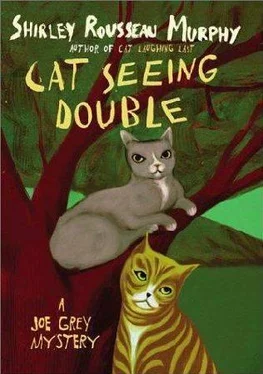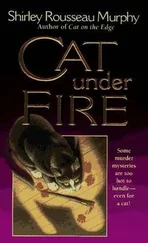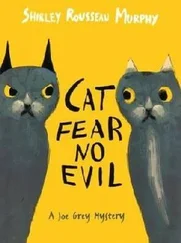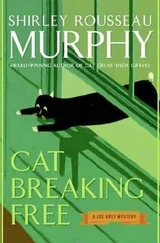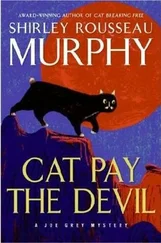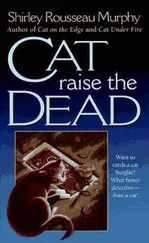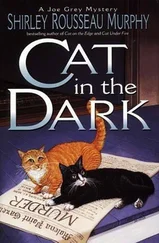The rattletrap truck sat in the road crosswise. Hurlie stood beside it resting on the fender like the heavy in an old B movie, a small-caliber rifle leaning beside him. Max touched his holstered Glock, wishing he'd left Charlie at the inn. He stepped out of the pickup. "Good morning, Hurlie. You want to move your truck out of the way?"
"I heard you was looking fer me. Thought I'd save you any more driving around, in this hot weather. What exactly did you want? You some kind of law?" Hurlie glanced in at Charlie with an insolence that made Max step closer to him.
"Right now I want you to move your truck. You're blocking the road."
Hurlie stared, his chin jutted out, his eyes on Max but glancing down at the Glock. "You were lookin' fer me you musta had a reason. I do somethin' wrong?" Gently his hand eased toward his pants pocket.
In one move Max grabbed Hurlie, spun him around and shoved him against the rusted truck, kicking his rifle into the dust. Pressing the Glock into Hurlie's ribs he patted him down, removing a snub-nosed Saturday night special from his pants pocket, two hunting knives and a straight razor from various pockets.
Hurlie, facing the cab of Max Harper's pickup, his hands pressed against the vehicle's roof, looked around at Harper. "So what's this about. I ain't done nothin'."
Max glanced at Charlie where she sat with her hand on the phone. He nodded.
As Charlie called the sheriff, Hurlie's expression remained one of puzzled innocence. Max arrested him for impeding the duties of a police officer, and cuffed him. "Sit down on the ground, Hurlie."
"It's dusty. Dust makes me cough."
"Sit down now."
Hurlie sat, stirring a cloud of dust.
"Why were you waiting for me? Why were you blocking the road?"
"You're that police captain from over to the coast."
"So?"
"So I heard you wanted to talk to me. I was just being cooperative, waiting here."
"Where's Gramps Farger?"
Though Dallas had a lead on Gramps, he hadn't found him yet, and there was no harm in shaking Hurlie up, see what he could jar loose. "Gramps staying with you, Hurlie? You'll feel better if you don't lie to me."
"What you want with him?"
"Is he living with you?"
"I ain't seen him since you sent my brother to prison."
"I don't believe that. And I know Curtis has been living up here with you."
"Ain't seen neither one. Can I get up? Like to smother in dust down here. Ain't no call to make me sick."
"Your shack is full of dust. You have everyone in that hollow covering for you. If I find Gramps up here, I'll lock your ass up for good, along with his. How long was Curtis here? Why did he go home? Be straight with me, Hurlie."
"You can't lock me up for nothin'."
"Harboring a delinquent, for starters. How long was Curtis here? What was he doing up here?"
"He wasn't here. I ain't seen him."
"You working up at the Landeau place?"
"What'd I do up at that fancypants place? Polish the silver? Where'd you get that notion?"
"Are you working for them up there?"
"Doing what?" Hurlie snapped. "Them high mucky-mucks wouldn't have me." As he scowled up at Max, a dust cloud appeared down the hill, the sheriff's car at its center winding up the twisting road.
The kit might be in exile, but her luxurious accommodations quite suited her. Wilma had left work at the library early in order to get her settled, and to visit with Cora Lee. She had brought Dulcie along for the ride, though Dulcie wouldn't be staying.
Following Cora Lee through the big, high-ceilinged living room, Wilma looked around with pleasure. The tired old hillside house, under the ministrations of its four new owners, was more charming each time she saw it. The four senior ladies were doing wonders, most of it by their own hard work.
The two women made an interesting contrast, both tall and slim, both in their sixties. Wilma's gray-white hair was done in a long, thick braid wound around her head. She was dressed in jeans, a red turtleneck T-shirt and red blazer. Cora Lee wore pale cream chinos and a mocha sweater that complemented her dusky complexion. She never understood why women of her coloring liked to wear plum and purple, the very shades that picked up all the wrong highlights. Moving toward the stairs, she was eager to see Wilma's reaction to how she had decorated her own room. The four ladies had drawn straws to choose their rooms, but Cora Lee suspected the outcome had been fixed. The upstairs room was the only one that offered a large alcove off the bedroom, which she could use as studio space.
The house belonged in part to Wilma; she and the other four ladies of the Senior Survival Club had bought the property together as a private retirement retreat. The structure was large enough to give each a spacious room and bath, and to accommodate as well a housekeeper and perhaps a practical nurse or caretaker when that time arrived. It hadn't yet, for any of the ladies. While each woman's room was designed to her own taste, the common living, dining, and kitchen areas were a triumph of compromise, a fascinating eclectic mix that the ladies had put together with a minimum of harsh words. In their intelligent cooperation Wilma found great encouragement against the time, far in the future, when she would sell her own home and move in with them.
The raftered great room with its raised fireplace and long window seat was done in a combination of wicker and leather, with contemporary India rugs, white plantation shutters and, scattered among the books in the wall of built-in bookcases, a collection of local, handthrown ceramics. Whoever had built the house had loved fireplaces; there was a raised wood-burning fireplace in nearly every room. Following Cora Lee up the stairs, Wilma was not prepared for her friend's decorating approach to her own large bedroom.
Because the apartment Cora Lee had recently vacated had been all in shades of cream and white and cafe au lait, Wilma expected the large, sunny upstairs retreat to be much the same.
But this room was wild with color, as bright as the Dixieland jazz that Cora Lee and Wilma loved. The walls were a soft tomato red. The long, cushioned seat that filled the big bay window, the wicker armchairs, and the bed, were piled with patterned pillows brighter than the artist's paints that Cora Lee favored. The room was a medly of reds and greens and blues and every possible color, all in the smallest and most intricate patterns. Pillows like jewels, like flower gardens; and Cora Lee's paintings on the walls were just as bright.
The kit, crouched on Cora Lee's shoulder, looked and looked, then leaped into the heap of cushions on the window seat rolling and purring.
"I think," Wilma said, "that she likes it. I love it!"
Cora Lee stood in the center of the room caught between laughter and amazement. "She does like it. Well, new things always smell good to cats. But… look at her pat at the brightest colors. Cats don't see color?"
"Maybe they do," Wilma said uneasily. "The world of science hasn't discovered everything yet." She glanced at Dulcie who stood beyond Cora Lee admiring every detail, and the two shared a look of delight. The private chamber was jewels set in cream, flowers scattered on velvet. The minute Cora Lee sat down on the window seat the kit stepped into her lap, nuzzling her hand, looking from her to Wilma so intelligently, so much as if she meant to join in the conversation, that Wilma stiffened, and Dulcie leaped to the cushions to distract her.
But the real distraction was the tea that Cora Lee had set out on the coffee table before the blazing fire. As the two women made themselves comfortable, the cats looked with interest at the lemon bars and shortbread; and Wilma fixed her gaze on the kit. 'This is your home for a little while, Kit. You are to behave yourself, you are to mind your manners."
Читать дальше
